Depending on where you live, bugs can be a serious problem. Insects thrive in warm and humid climates, drinking the blood of the furry friends they hitch a ride on. Not only are insect bites uncomfortable for your dog, but they increase their exposure to parasites and can cause serious medical complications.
Fleas have the potential to cause a host of medical issues for your best friend. Dogs with sensitivities to flea saliva can suffer from dermatitis which causes intense itching, reddened skin, scabs, hot spots, and skin infections. In severe cases, anemia is also a risk, since the average flea can ingest up to 15x its body weight in blood!
Similarly, ticks can cause skin irritations but bring the added risk of disease transmissions – most common of which are Lyme Disease, Ehrlichiosis and Rocky Mountain Spotted Fever. These are all serious and potentially fatal conditions which require medical treatment.
Mosquito’s can be more than just a nuisance as well. They have been know to transmit heartworm parasites and West Nile Virus to dogs.
With the stakes so high, what is a pet parent to do?
No one wants the nuisance or the medical issues that are associated with flea, tick or mosquito infestations. Despite what people may think, pest control does not have to be “one size fits all”! No two dogs are the same and pest control solutions shouldn’t be either!
Pet parents, there ARE alternatives to traditional chemical laden collars and spot-on drops! With the bug season quickly approaching, we wanted to make sure our readers know more about the natural pest control options that are out there!
Status Quo – Woah!
Maybe you are wondering “what’s the big deal with traditional topicals”? Well, these spot-on treatments contain dangerous pesticide chemicals that don’t fit into the natural lifestyle that so many pet parents strive to provide for their furry friends. If warnings such as “in case of contact, wash hands” or “toxic for cats” feel a bit unsettling, you certainly are not alone!
Scary, right!
Many believe that chemicals are the only/best way of treating fleas and ticks; we won’t argue with their effectiveness, but we must not ignore the cost of that result. In exchange for “peace of mind,” we apply pesticides to our dog’s skin which enters their bloodstream, and remains at high enough levels to kill any flea or tick that bites him/her for over a month. Woah, that is a scary thought!
There is an ongoing body of research suggesting that the active ingredients in these topical’s can be linked to brain damage, heart attacks, seizures and more!
Regardless of where you fall in the chemical versus natural flea treatment debate, there are many options on the market that utilize the insect repellent properties of plants to offer added protection naturally. While spot-on treatments are convenient and sometimes necessary, there are many natural options that work one step ahead of chemical treatments and can be used to repel pests before they bite.
Natural Pest Control – How Does it Work?
The most common natural alternatives come in the form of wipes and sprays that utilize essential oils to reduce the desirability of your pet as a snack to pests such as fleas, ticks and mosquitoes. One of the major benefits of natural solutions is that they work to reduce access to your pet. Simply put, natural sprays help to prevent bites before they happen!
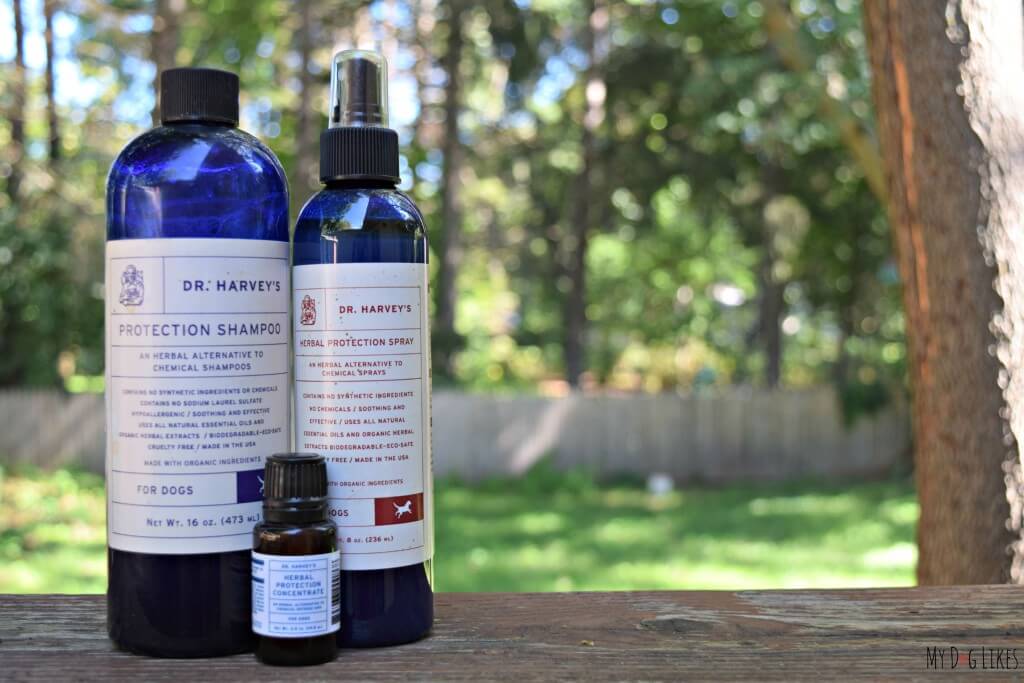
Natural Oils
The following are some of the most common oils used in all-natural pest control products. These have been used by indigenous tribes for hundreds or even thousands of years!
It is important to note that despite these ingredients being natural, it is not typically recommended that you mix them yourself since an incorrect amount of dilution could cause irritation to your dog’s skin!
Lemongrass Oil
Extracted from the leaves of the Lemongrass plant, it has a fresh, lemony scent and is known for its insect repellent properties.
Catnip Oil
Extracted from the leaf of a perennial herb belonging to the mint family, catnip oil is up to 10 times more effective at repelling bugs that harmful chemicals like DEET.
Citronella Oil
Extracted from the leaves of grasses in the Lemongrass family, this plant is recognized by the Environmental Protection Agency (EPA) as a biopesticide. It works by making it difficult for pests such as mosquitoes and fleas to locate you/your pet.
Cedar Oil
Derived primarily from Juniper and Cypress trees, cedar oils have been shown to be toxic to fleas, ticks and mosquitoes.
Natural Insect Repellent – What are my Options?
Sprays
All-natural sprays can be shaken and misted on your dog’s coat to provide a natural flea barrier. These products can be applied before outdoor activities, after swimming, or, if you’ve been out and about for a while, right in the middle of playtime. Sprays are great for covering large dogs with dense coats and are super convenient. Be sure to avoid delicate areas like your dog’s eyes! Those are best done by soaking a rag and carefully wiping them down!
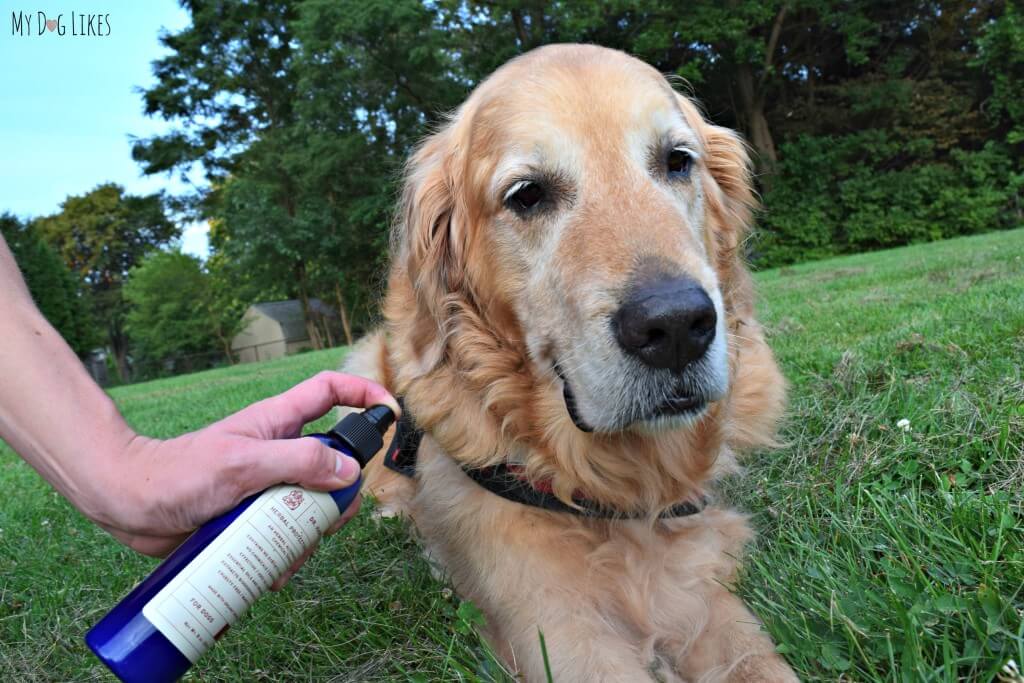
Dr. Harvey’s Herbal Protection Spray has become our go-to natural bug repellent spray. Utilizing Catnip Oil, Citronella Oil, Erigeron Oil, Neem Oil, and Cedarwood Oil – not only does it work great, but it is extremely easy to apply. During the Spring and Summer we keep a bottle right by the door and give the boys (and ourselves) a quick daily spray as we head out on a walk!
Wipes
Wipes are a great way to conveniently protect delicate areas like faces. They can be used on both small and large dogs, but will be more cost effective for a smaller dog who has less surface area to cover. Wipes contain all of the same pest repelling oils as sprays but without the worry of getting it in their eyes!
We have tested Pet Naturals of Vermont’s repellent wipes and found them to be very effective at keeping bugs away!
Shampoos
Natural flea and tick shampoo’s utilize the same essential oils as sprays and wipes, but they are embedded in a shampoo instead. This helps to get a great distribution of repellent oils over your pets entire body.
We make sure to use this flea and tick shampoo from Dr. Harvey’s during the Spring and Summer for added protection against pests.
Lawn Treatments
If your pets spend a lot of time in your yard, perhaps it makes sense to be a bit proactive. Many natural pest repellents can be purchased in large concentrates for lawn application with a hose.
Want to take it a step further?
Perhaps you have seen the most recent episode of Shark Tank? A company called Wondercide just landed a deal for their all-natural pest control products which are safe for pets but actually kill pests on contact. Primarily utilizing the power of cedar oil, and not diluted with water, these products are much more powerful than other natural repellents.
You are likely wondering how they are still safe? According to the Wondercide website, cedar oil blocks the octopamine recepter that is crucial to life in pests such as fleas and ticks. Cedar oil repels pests from areas of application and actually kills them if they come into contact with it. Mammals, birds, fish, amphibians and beneficial insects do not have octopamine neurotransmitters and are thus unaffected by cedar oil.
We refuse to use chemical pesticides in and around our home so we can’t wait to try out Wondercide’s suite of products. Stay tuned for a comprehensive review later this Spring/Summer!
So what are our best tips for Natural Pest Control?
- Use natural sprays/wipes before extended outside time or after swimming. There are many products out there that use the natural pest repellent properties of essential oils to keep bugs away year round!
- Keep your dog healthy, clean, and comfortable with regular baths and grooming. Always be on the lookout for fleas or ticks on their skin. Notice a problem and seek help before it gets out of hand!
- Keep their bedding, carpets, and other dark, cozy spots for fleas, clean, by vacuuming and washing regularly.
- Keep your yard clean of debris and standing water. Natural sprays can also be purchased to treat your yard and reduce the number of fleas, mosquitoes, etc, that are present.
- Use common sense. Talk to your Veterinarian about options, there are no right or wrong answers, just what is right for your dog. Remember that what you put on your dog, goes in your dog. Don’t use a product on them, that you don’t feel comfortable putting in them!

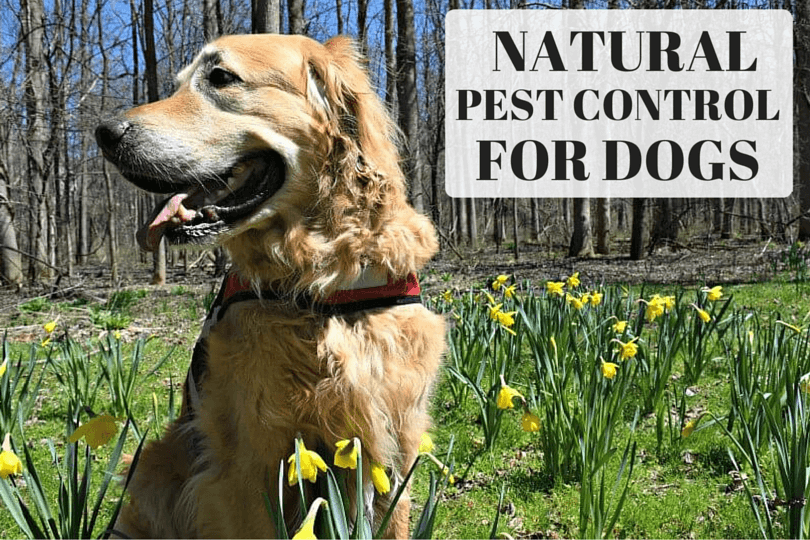
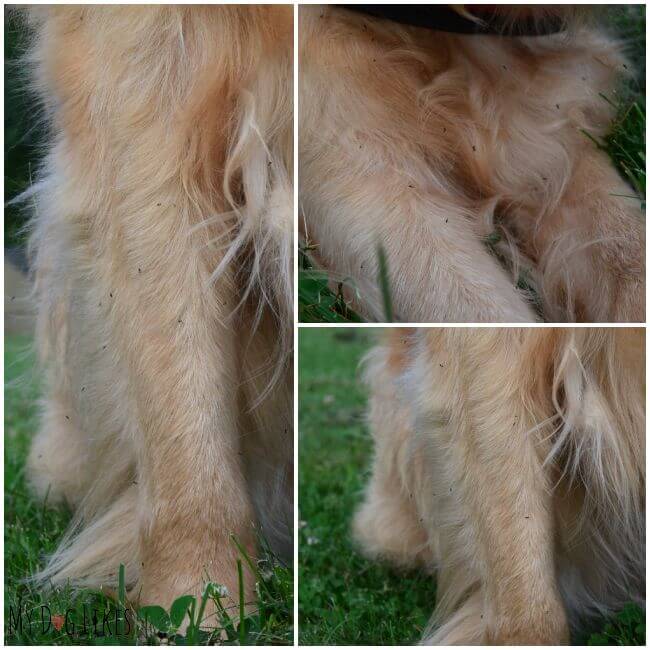

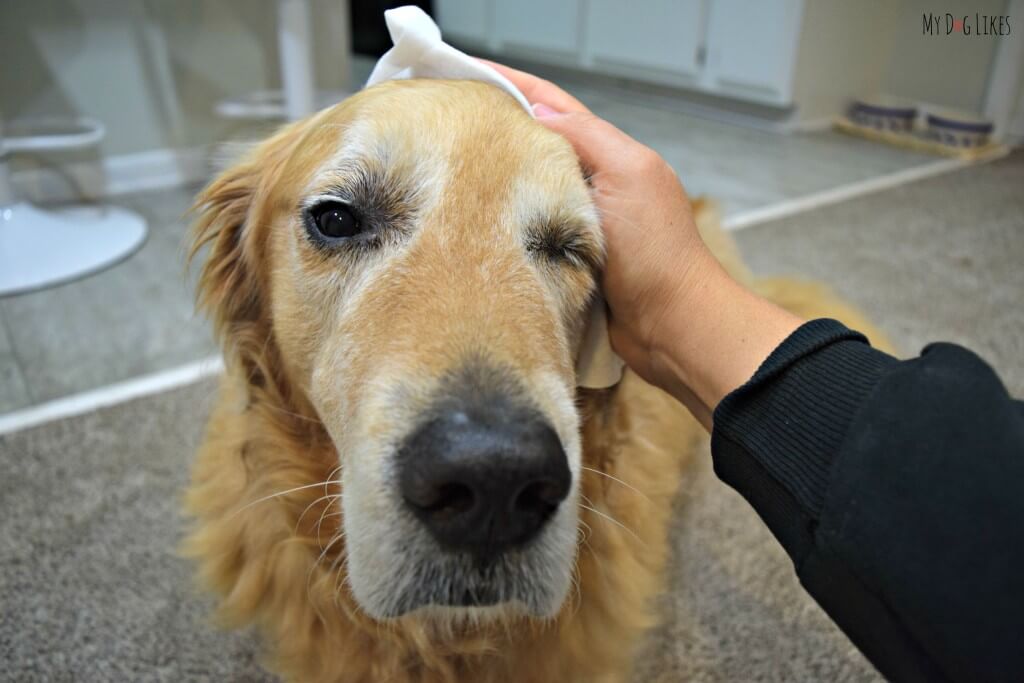
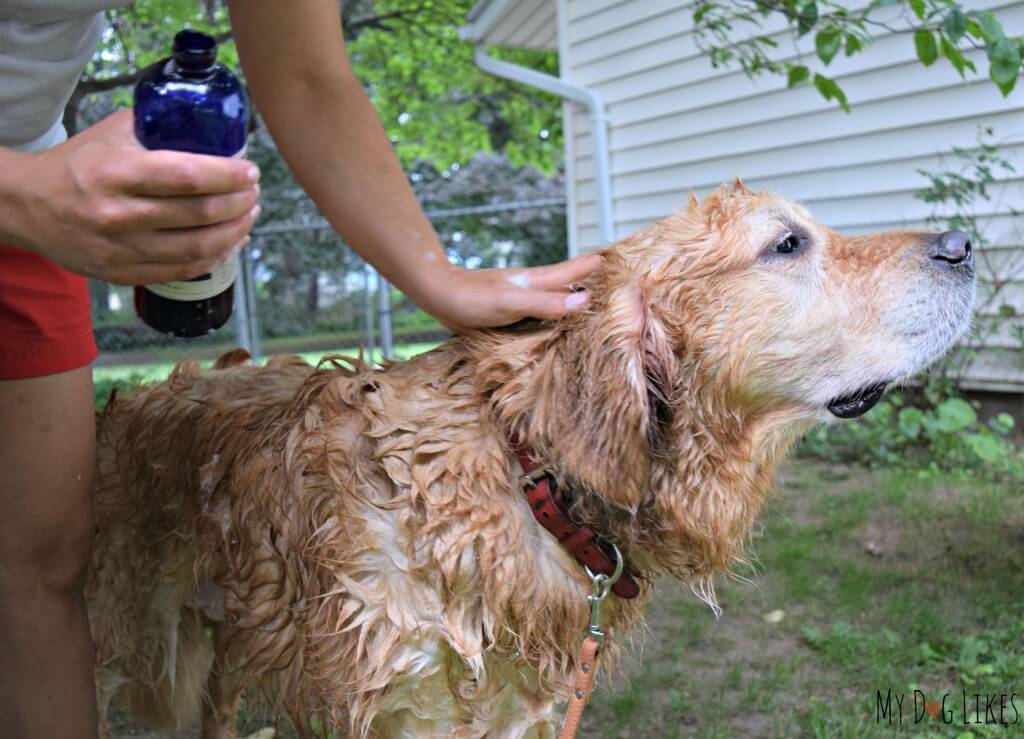
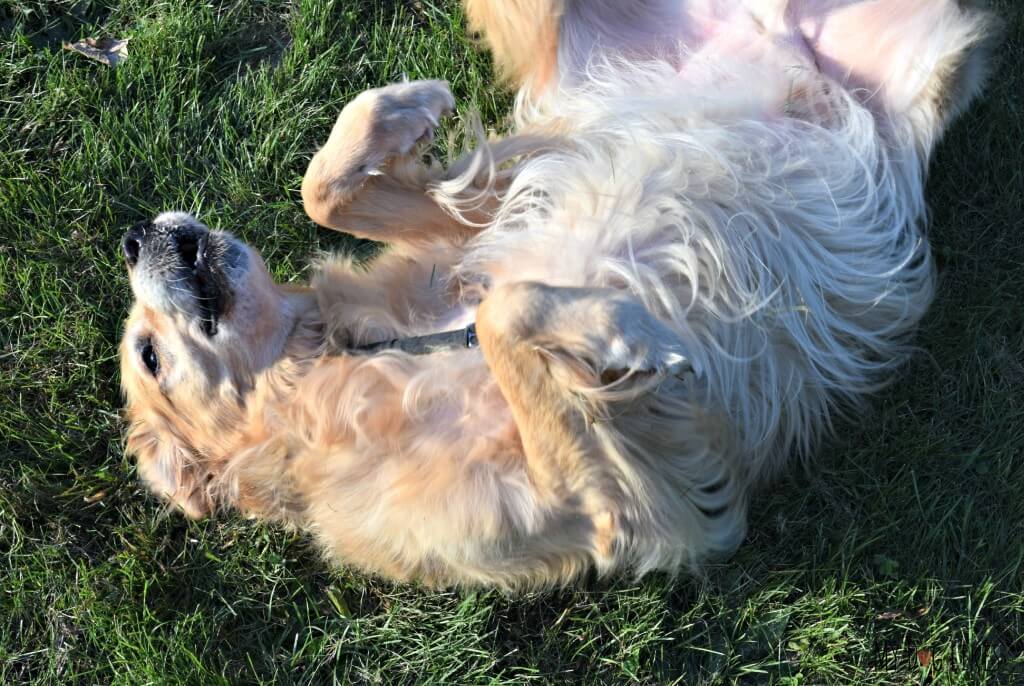







Thanks for sharing this. It gives me lots to think about! When Georgie was at the vet last time, he gave us a free sample of Revolution, and although I’ve used it on my pets in the past, I’m just so hesitant now. I hate fleas, and of course I want to protect her from the dreaded heart worm, but chemicals just seem so harsh.
Great post, Rachael! There are so many pet owners desperately seeking a safer alternative to this flea/tick problem. After my one Pom, Sawyer, had his second seizure from Frontline, that went in the garbage. Then switched to Trifexis and my smallest Pom almost died from that. I desperately searched for something else and found the Pet Protector and was SO excited about it, I actually became a distributor. Sadly, after using it for 1 yr, I realized it wasn’t doing enough and my poms were still getting fleas. I have used Dr. Ben’s Cedarwood Oil spray with success; however, it stinks to high heaven and makes my pom’s fur greasy. I’m definitely going to look into Wondercide. Right now, I’ve got my 3 boys on Bravecto, which has proven to have no side effects and has been the most effective pest treatment so far. Still, it is an internal med, so never can be too cautious.
I travel all over the world with my dog. One of the great things about knowing what to use is that I can often find those ingredients on location and make my own stuff! Fleas on a sailboat? NO fun!! Fleas on a plane either! And hotel rooms … ugh. Great post.
Not using chemicals is always the best way to go. You can also treat your yard and house with diatomaceous earth to kill fleas.
Thank you so much for the suggestion – We are planning to try out as many natural solutions as possible and update this post as we learn more!
This is a great post! One of the things to also consider is the size of the animal – even for those who take the monthly ‘pill’ if your pup is below a certain weight be very, very careful as neurological issues can emerge. I’m going to reread this throughout the next month and discuss carefully and thoughtfully with our holistic vet – you’ve given us something to think about!
We are pretty fortunate where I live that we don’t have a huge flea problem but we do have to be very careful about ticks, especially when we head out on hikes. I appreciate the timing of this post as we are just heading into warmer weather and I am always looking for new natural products to try. I love the idea of wipes and sprays for hiking and camping.
We saw Wondercide on Shark Tank and it is the first natural solution we are considering. Since we are out in the tall grass and woods a lot with tracking, we need something reliable. Sprays and wipes just don’t cut it for us. Nice post.
Thank you for this post – it was such great timing. I definitely want to switch to something with less chemicals and products that are more natural. Don’t know if that is what contributed to Shiloh’s death but I don’t want to find out the hard way – want to switch Shasta before that happens. Already found out that our favorite online store for pet supplies, Chewy.com carries them which is where I already get her dog food and other supplies.
Oh and I forgot to thank you so much for stopping by our blog – you got exactly what I thought of when I saw Shasta doing that. Don’t know if that is what she really was doing but it sure looked that way to me and they really looked a lot alike, in coloring. (they really were uncle and niece by bloodline)
Awesome info. I love love love essential oils. It’s great that Dr. Harvey’s offers offers a natural spray also. I did not know this!
Fantastic tips! I use natural pest control on my lawn, but I do use Heartgard and NexGard for heart worms/fleas/ticks. Nola has flea allergies, and we live in Florida.
I’m very curious about those wipes! I’ll have to check them out. Thanks for sharing!
This is perfect timing! Just found a flea on one of the dogs today, ugh! I’ve been wanting to find more natural products, definitely going to give Dr. Harvey’s a try. Fleas are the worst here for us once the temperature rises. Look forward to your next review you mentioned. Thank you!
Very nice job raising awareness about the downside of the “oh so effective” chemical pest preventatives. One year since putting an end to pills, topical applications/sprays containing harsh chemicals and Missy & Buzz remain flea & heartworm free. I’ve been boosting their immune systems with a healthy raw diet and using nothing but truly natural pest preventatives (Dr. Harvey’s spray and shampoo has been one of my healthy choices, too!).
I will stay tuned for your results and share with my readers! Keep up the great work. Your blog is amazing and truly one of my favourites!
Great Post! I will need to look into Wondercide for lawn treatments because it is the beginning of flea season here in California.
We sprayed our yard with CedarCide cedar oil and it really seemed to help. We had no fleas and few ticks (which also may have been picked up outside of the yard). We also use tags from Only Natural Pet. But we are always looking for new and safe products to try. We’ve used the Vermont Naturals as well. Our biggest issue is ticks and they are really hard to repel!
Apple Cider vinegar is what I use for everything 🙂
Thanks for the tip, Ruth – we will definitely look into this!
“Warm and Humid” is the best way to describe where I live. I use the Flea and Tick Shampoo from Dr.Harvey as well for our little Yorkie.
Great post here!
Thanks for sharing! Natural remedies are always better to repel fleas. I tried apple cider vinegar and some essential oils to get rid of fleas on my Bassett Hound and it was just enough. No need for chemical treatment (sometimes it can be dangerous).